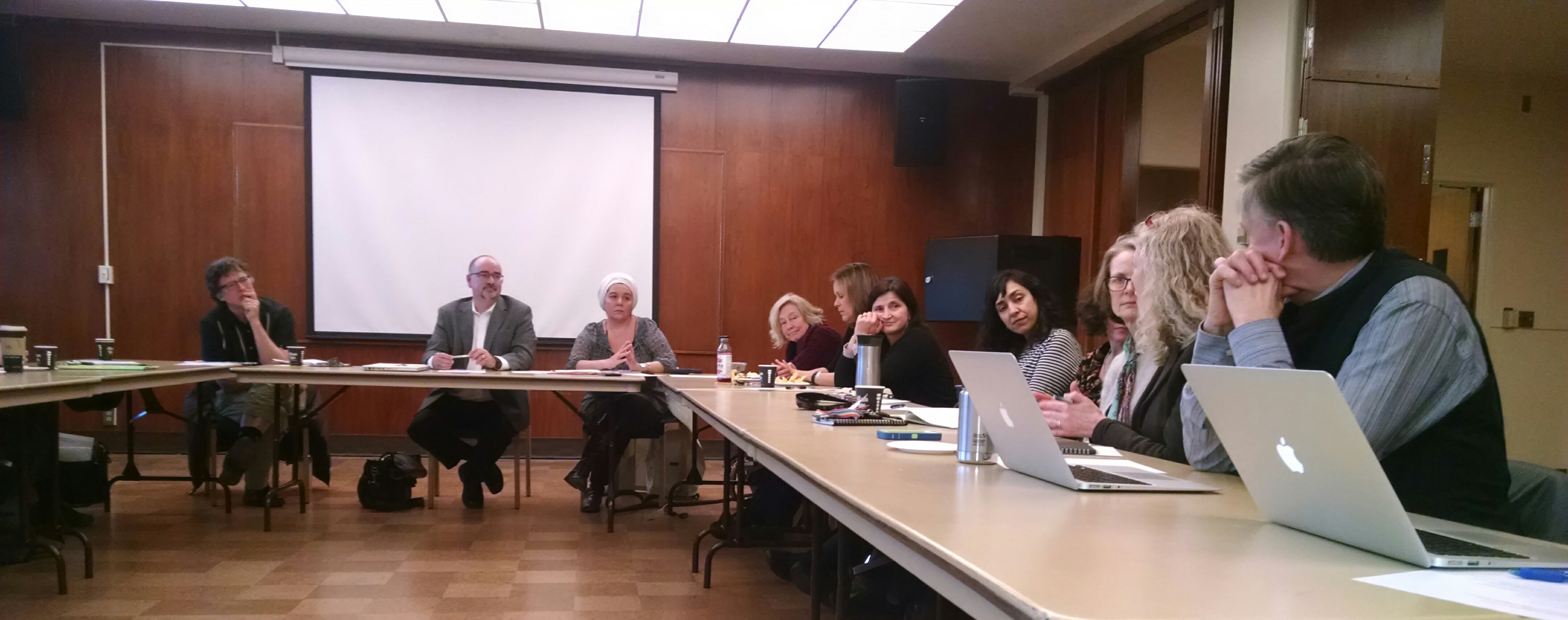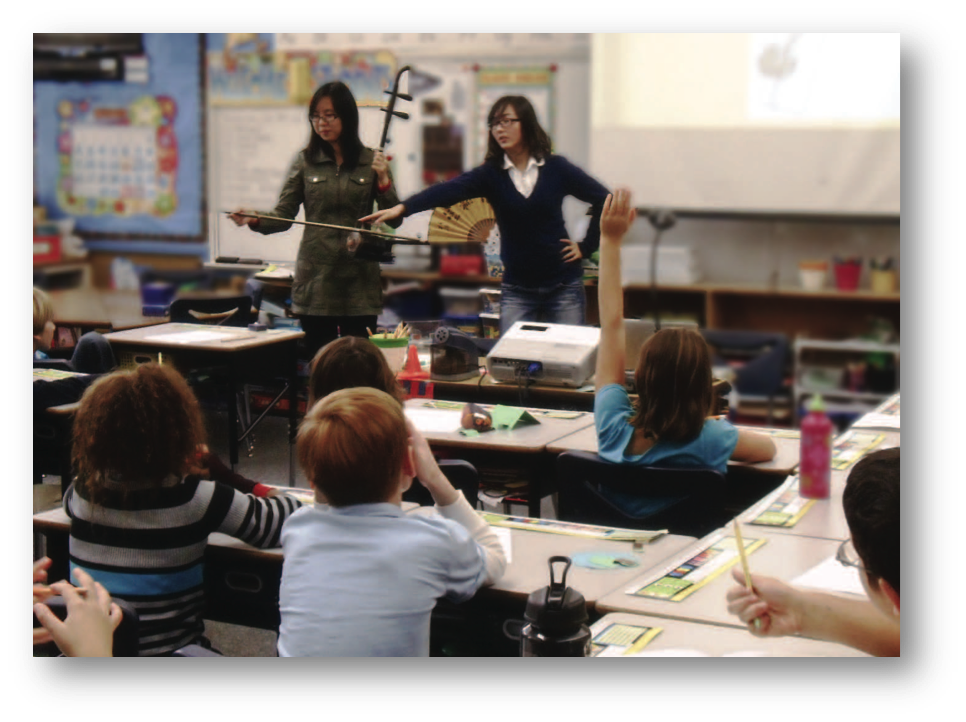Contents
Content Type: 1
Title: Un señor muy viejo con unas alas enormes
Body:
From https://mrpeto.wordpress.com/
In this blog post, Mike Peto shares a lesson or sequence of lessons on García Márquez's short story. He has used this in a fourth year high school class but he now uses it with heritage students only. He starts with an embedded reading to make the text more accessible, although you could also consider pre-teaching vocabulary or promoting the use of various reading skills to tackle the linguistic challenges students may encounter while reading the text. He then shows a 10-minute excerpt of the 1998 version of the film before moving on to analyzing the short story. There is a document with all the activities included and some possible extension activities like puzzles and games.
Access the lesson at https://mrpeto.wordpress.com/2015/01/17/un-senor-muy-viejo-con-unas-alas-enormes/
Source: My generation of polyglots
Inputdate: 2015-01-30 11:48:16
Lastmodifieddate: 2015-02-02 03:11:59
Expdate:
Publishdate: 2015-02-02 02:15:01
Displaydate: 2015-02-02 00:00:00
Active: 1
Emailed: 1
Isarchived: 0
Content Type: 1
Title: Film Reviews
Body:
From http://www.teachingenglish.org.uk/article/film-reviews
Here is the most recent lesson post from Teaching English, submitted by Paul Braddock, and materials by Katherine Bilsborough. For CEFR levels A2 - B2, about novice high to advanced low on ACTFL Proficiency levels, this approximately 60 minute lesson plan includes downloadable PDF of lesson plan and student handout. "In this lesson learners will revise some film review vocabulary through pair-work discussions. They will write their own film review after analysing a model. Then they will read each other's reviews and have a class vote about which film looks most interesting. Aims: To encourage students to join in a discussion; To develop students' writing skills; To train learners to spend time planning before they write."
Access this resource at http://www.teachingenglish.org.uk/article/film-reviews
Source: British Council
Inputdate: 2015-01-30 11:49:56
Lastmodifieddate: 2015-02-02 03:11:59
Expdate:
Publishdate: 2015-02-02 02:15:01
Displaydate: 2015-02-02 00:00:00
Active: 1
Emailed: 1
Isarchived: 0
Content Type: 1
Title: English Film-Based Lesson: Beauty Patch
Body:
Kieran Donaghy shares a lesson on the topic of beauty for intermediate level classes. It includes some activities built around an authentic video on an experiment carried out with women and it offers practice on the use of adjectives.
Access the lesson at http://film-english.com/2015/01/19/beauty-patch/
Source: Film English
Inputdate: 2015-01-30 11:51:04
Lastmodifieddate: 2015-02-02 03:11:59
Expdate:
Publishdate: 2015-02-02 02:15:01
Displaydate: 2015-02-02 00:00:00
Active: 1
Emailed: 1
Isarchived: 0
Content Type: 1
Title: 50 Ways to Use Music & Song
Body:
From http://ddeubel.edublogs.org/
Students love to learn through songs, and they are a great authentic resource to keep them motivated. This week, David Deubelbeiss is sharing ideas on how to make the most of using music and songs in language teaching. So if you are tired of the fill in the blank activities, have a look and explore new ways to create activities with songs. He also seems to be preparing more lists of “50 ways to…”, so we’ll keep an eye on his blog.
Access the list at http://ddeubel.edublogs.org/2015/01/29/50-ways-to-use-music-song/
Source: EFL 2.0 Teacher Talk
Inputdate: 2015-01-30 11:52:15
Lastmodifieddate: 2015-02-02 03:11:59
Expdate:
Publishdate: 2015-02-02 02:15:01
Displaydate: 2015-02-02 00:00:00
Active: 1
Emailed: 1
Isarchived: 0
Content Type: 5
Title: Revitalizing Language and Culture Education at the University of Oregon
Body:
by Mandy Gettler, CASLS Associate Director
CASLS recently joined a revived University of Oregon Language Council. With a national trend of 20% declining enrollment in higher education language courses, the UO Language Council will tackle the challenge of bringing language education back to the forefront of the campus’ academic mission.
“We will find a way to reverse the tide of declining language enrollment,” declared Vice Provost for International Affairs Dennis Galvan. “This group will be instrumental in developing concrete steps that will lead to the reinvigoration and transformation of language education on campus.”
The Language Council formed five working groups focused on:
- Streamlining central support processes in a way that helps students identify language and culture study as an option
- Conducting market research and developing a marketing campaign
- Identifying ways to demonstrate to students the benefits of language and culture study,
- Innovating language curriculum
- Coordinating policy among Council members
CASLS Director Dr. Julie Sykes will join the working group focused on curricular innovations, and CASLS Associate Director Mandy Gettler will join the group conducting market research. Both will be invested in coordinating policy among Council members.

The Language Council meeting was convened by the Vice Provost for International Affairs Dennis Galvan, Senior Italian Instructor Harinder Khalsa, and Yamada Language Center Director and long-time CASLS collaborator Jeff Magoto.
Source: CASLS Spotlight
Inputdate: 2015-02-01 12:15:39
Lastmodifieddate: 2015-02-02 03:11:59
Expdate:
Publishdate: 2015-02-02 02:15:01
Displaydate: 2015-02-02 00:00:00
Active: 1
Emailed: 1
Isarchived: 0
Content Type: 5
Title: New Cohort for Oregon International Internship Program
Body:
CASLS is pleased to welcome the next group of students for the Oregon International Internship Program (OIIP). OIIP students are future teachers from China, Japan and Taiwan who come to Eugene for five months. Through a full-time internship in the U.S., they put theory into practice and gain hands-on experience to become professional teachers in both cultural settings. To support their internship at a local school, students take two academic courses (Intercultural Communication and Language Pedagogy). They also participate in a structured mentor system.

In order to make the best use of the students’ time abroad, the curriculum is carefully designed to facilitate a successful experience. The program supports and facilitates students’ cultural and language learning through
• a full time internship at a K-12 institution under a mentor teacher
• explicit instruction on intercultural communication
• onsite and ongoing mentoring both at personal and professional level
We welcome the next group of students and look forward to watching them grow.
Source: CASLS Spotlight
Inputdate: 2015-02-02 17:00:05
Lastmodifieddate: 2015-02-09 06:59:00
Expdate:
Publishdate: 2015-02-09 02:15:01
Displaydate: 2015-02-09 00:00:00
Active: 1
Emailed: 1
Isarchived: 0
Content Type: 4
Title: Persuading Visitors to a Country and Reflection on World Governments
Body:
Elizabeth Robinson is an Instructional Designer at BYU Independent Study. She taught Spanish at the junior high, university level and currently teaches online. She graduated in 2014 with a Master’s in Spanish Pedagogy from BYU.
In this unit, groups of students are given the opportunity to function under a unique government while creating a presentation to persuade a native speaker to come to their assigned country. Communication is limited to chat through Google Doc and Google Slides, which is monitored by the instructor to maintain communication in the target language.
Groups present to a native speaker who decides which country he/she will visit based on the information students provide and their persuasive arguments. After completing their presentations, students reflect on their observations using VoiceThread.com and their work is posted to a group Weebly.com page.
Objective:
• Students will create a presentation to persuade a native speaker to come to their country.
• Students will reflect on what it would be like to be from a different country with a different form of government.
Resources:
• Country Presentation Template-Spanish
• Country Presentation Template-English
Preparation:
1. The instructor posts the “Country Presentation Template” to a Google Doc to insure his/her access to student work and to monitor chats. The Google Doc will then need to be shared with students. (Note: Instructors may also change the country on the template to use other countries with varying government types. You may also want to add specific grammar requirements to each section.)
Procedure:
1. Students are divided into groups and assigned a country. Students are given instructions to create a presentation to persuade a native speaker to come to their own country. A template is shared with them through a Google Doc. Students then begin dividing up responsibilities through the Google Doc chat according to their structure of government.
2. During the preparation stage (described in procedure 1) the main government official of each country is given extra items (food, drinks, etc.) Some days there is only enough for him/her, and other days there is enough for the rest of the group if he/she decides to share. (This is to help students reflect on inequality and what it would be like to be a part of a different form of government.)
3. Students present to a native speaker, who then decides which country he/she is going to visit based on the information students have presented.
4. Students reflect on their assignment using a VoiceThread that is then shared with the class using Weebly.com. Instructions are included in the “Country Presentation Template”. An example may be viewed at http://voceshispanas.weebly.com/. For pictures of classroom, see http://robinsonspanish.weebly.com/
Source: CASLS Activity of the Week
Inputdate: 2015-02-05 11:38:25
Lastmodifieddate: 2015-05-14 13:40:50
Expdate:
Publishdate: 2015-03-23 02:15:01
Displaydate: 2015-03-23 00:00:00
Active: 1
Emailed: 1
Isarchived: 0
Content Type: 1
Title: Book: Corpus Pragmatics
Body:
From http://linguistlist.org/issues/26/26-215.html
Corpus Pragmatics
Edited by Karin Aijmer and Christoph Rühlemann
Published by Cambridge University Press
Corpus linguistics is a long-established method that uses authentic language data, stored in extensive computer corpora, as the basis for linguistic research. Moving away from the traditional intuitive approach to linguistics, which used made-up examples, corpus linguistics has made a significant contribution to all areas of the field. Until very recently, corpus linguistics has focused almost exclusively on syntax and the lexicon; however corpus-based approaches to the other subfields of linguistics are now rapidly emerging, and this is the first handbook on corpus pragmatics as a field. Bringing together a team of leading scholars from around the world, this handbook looks at how the use of corpus data has informed research into different key aspects of pragmatics, including pragmatic principles, pragmatic markers, evaluation, reference, speech acts, and conversational organisation.
Visit the publisher's website at http://www.cambridge.org/us/academic/subjects/languages-linguistics/semantics-and-pragmatics/corpus-pragmatics-handbook?format=HB
Source: LINGUIST List
Inputdate: 2015-02-06 14:21:46
Lastmodifieddate: 2015-02-09 03:15:19
Expdate:
Publishdate: 2015-02-09 02:15:01
Displaydate: 2015-02-09 00:00:00
Active: 1
Emailed: 1
Isarchived: 0
Content Type: 1
Title: Book: Code-switching Between Structural and Sociolinguistic Perspectives
Body:
Code-switching Between Structural and Sociolinguistic Perspectives
Edited by Gerald Stell and Kofi Yakpo
Published by De Gruyter
The study of code switching has been carried out from linguistic, psycholinguistic, and sociolinguistic perspectives, largely in isolation from each other. This volume attempts to unite these three research strands by placing at the centre of the enquiry the role played by social factors in the occurrence, forms, and outcomes of code switching.
The contributions in this volume are divided into three parts: “code-switching between cognition and socio-pragmatics”, “multilingual interaction and identity”, and “code-switching and social structure”. The case studies represent contact settings on five continents and feature languages with diverse linguistic affiliations. They are predictive and descriptive in their research goals and rely on experimental or naturalistic data. But they share the common goal of seeking to explain how social structures, ideologies, and identity impact on the grammatical and conversational features of code switching and language mixing, and on the emergence of mixed languages.
Given its scope, this volume is a significant addition to the empirical and theoretical foundations of the study of code switching. It is also of relevance to the general debate on the inter-relationships between language and society.
For more information access the publisher’s website at http://www.degruyter.com/view/product/248169?format=G
Source: De Gruyter
Inputdate: 2015-02-06 14:22:55
Lastmodifieddate: 2015-02-09 03:15:19
Expdate:
Publishdate: 2015-02-09 02:15:01
Displaydate: 2015-02-09 00:00:00
Active: 1
Emailed: 1
Isarchived: 0
Content Type: 1
Title: Call for Workshop Proposals: 2015 NYSAFLT Annual Conference
Body:
From http://www.nysaflt.org/forms/secure/conference/2015/workshop_submission/index.shtml
The New York State Association of Foreign Language Teachers annual conference will take place October 30-31, 2015, in Saratoga Springs. The conference theme is "21st Century LOTE Education: Providing the Keys to College and Career Readiness."
Workshop proposals received after February 15 will be considered on a space available basis.
For more details about the conference and a link to the proposal submission web form, go to http://conference.nysaflt.org/2015/
Source: NYSAFLT
Inputdate: 2015-02-06 14:28:40
Lastmodifieddate: 2015-02-09 03:15:19
Expdate: 2015-10-31 00:00:00
Publishdate: 2015-02-09 02:15:01
Displaydate: 2015-02-09 00:00:00
Active: 1
Emailed: 1
Isarchived: 0
